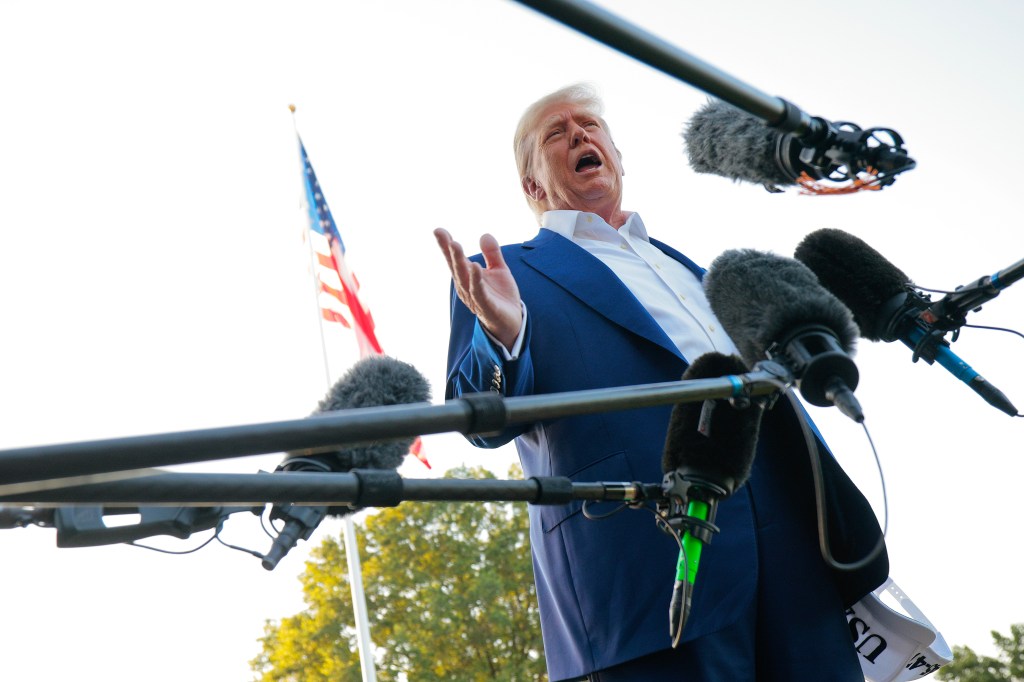“Wasn’t Trump calling for unconditional surrender like two days ago?” Matt Yglesias wondered as news of a ceasefire between Israel and Iran brokered by the White House spread.
It was seven days ago, actually. But in fairness to Yglesias, it’s not easy to keep the timeline straight on Donald Trump’s sudden transformation into John McCain.
Two days ago was when the president endorsed regime change in Tehran lest the mullahs fail to, and I quote, “MAKE IRAN GREAT AGAIN.” The “unconditional surrender” demand came last Tuesday, the same day he casually threatened in a social media post to assassinate Iran’s supreme leader if Americans in the region were attacked.
The day after that, he told reporters that he wasn’t interested in a ceasefire. “A ceasefire means everything’s going swimmingly, we’ll take a little time off; it’s not,” he explained. “We’re not looking for a ceasefire, we’re looking for a total, complete victory. Again, you know what the victory is: no nuclear weapon.”
Then, yesterday, he turned around and … brokered a ceasefire, one that both sides quickly violated, to his profane annoyance. (It’s back in effect as of late Tuesday afternoon, but stay tuned.) No wonder Yglesias is confused.
As a non-paying reader, you are receiving a truncated version of Boiling Frogs. You can read Nick’s full newsletter by becoming a member here.
There’s no inconsistency in my position, Trump would say. A ceasefire is in order now because the U.S. did achieve “total, complete victory” when it “obliterated” Iran’s enrichment facilities this past weekend. The problem is that it’s not clear that each of those facilities truly was obliterated, just as it’s also not clear what happened to the hundreds of pounds of highly enriched uranium that the regime had socked away for future bomb-building.
America scored a victory by hobbling Iran’s nuclear program, but “total, complete victory” logically implies total, complete denuclearization. Again, stay tuned.
There’s actually an easy story one can tell to explain Trump’s otherwise perplexing shifts over the past week. As was true of his “Liberation Day” tariff fiasco and the rapid walkback that followed, he’s not executing a strategy so much as he’s oscillating between his impulse to ruthlessly impose his will and his need to demonstrate his supposed mastery of the art of the deal. He was intoxicated by the military glory Israel gained from pounding Iran and couldn’t resist getting in on it, especially once he realized that the enemy was powerless to repel a U.S. attack. Then he got a dovish earful from (parts of) his base about the risks of escalation and climbed down, pressuring the two sides to stop shooting and reasserting himself as history’s greatest dealmaker with embarrassingly florid hype.
His public and private bitterness toward Israel after it violated the ceasefire this morning was telling in how it reeked of wounded pride. It wasn’t the Israelis who had broken the truce, after all: Iran did so overnight when it launched a new volley of missiles that killed at least four people, compelling Benjamin Netanyahu and his team to respond. But to Trump, the personal humiliation he would have felt from seeing the deal he brokered fall apart outweighed the need to punish Iran for its violation. In the end, to save face, he pressured Netanyahu to retaliate in only a token fashion. From “unconditional surrender” to that in seven days.
That’s the “Occam’s Razor” history of U.S. involvement in the Iran war—but it’s not the history that America’s various political factions will tell about it. Republican hawks, Republican doves, and Democrats will each draw different lessons about the conflict. And, interestingly, each is likely for its own reasons to conclude that “the Trump doctrine” that’s been playing out in Iran shouldn’t be followed by future presidents.
The Democrats’ history: The war didn’t merely fail to achieve its goals, it backfired.
Democrats have the easiest task of the three factions because they needn’t worry about bruising the president’s tender ego. They can and will call the war a mistake that will do more harm than good to the United States and Israel long-term.
Their history will begin with Trump’s decision in 2018 to end the bargain with Iran that Barack Obama had struck three years earlier. As far as Western experts can tell, the Iranians abided by that agreement by reducing the number of new uranium centrifuges they installed; only after Trump quit the deal did thousands of new ones begin to come online. Diplomacy was working, Democrats will say. Trump used air power to “solve” a nuclear crisis that he himself had needlessly created.
The left will also play the long game with respect to Iran’s post-war capabilities. Any evidence that emerges that its enrichment facilities or its stockpile of enriched uranium survived will be taken as proof that military power can’t stop nuclear proliferation. (Well, usually.) On the contrary, they’ll say, Trump’s decision to attack will incentivize it. To prevent the next Operation Midnight Hammer, Iran now has a choice between capitulating on America’s terms or doubling down on building a secret nuclear deterrent.
Countries, especially ones led by fanatics, don’t typically surrender after one battle.
There’s another potential long-term consequence from the war that liberals will be watching for. Trump’s dream of regime change in Iran might come true, but not in the way he’s hoping. Multiple observers have argued this past week that Iran’s Revolutionary Guard Corps, the military wing of the regime’s Shiite fundamentalist project, is likely to gain influence over the government in the aftermath.
“The military men have gained ascendance over the religious clerics for the first time since Iran’s revolution in 1979,” The Economist asserted in a piece published on Monday. “And they are not moderate.” Due to indoctrination and disposition, the leaders of the Guard likely aren’t inclined to make peace with Donald Trump, particularly after he assassinated their hero five years ago. (“Sure as anything they will be going for a nuke. It’s absolutely disastrous,” one Gulf mediator told the publication.) Iranian moderates who prefer negotiations with the U.S. now have to explain why their next olive branch won’t end the same way their most recent one did, with their nuclear facilities in flames.
If the clerical leadership fell, the Guard wouldn’t let itself be displaced by some rival Iranian faction without a fight. They have their fingers in every piece of the country’s economic pie; as with most revolutionary movements, underneath the ideological argle-bargle is plain ol’ mafia-style graft. If the only way to guarantee that Iran denuclearizes is to replace the regime, how do you do that once the Guard is the regime?
Mainstream Democrats will take all of that into account and define “the Trump doctrine” in Iran as giving up on diplomacy prematurely in favor of the foolish belief that we can bomb other countries into permanent compliance with our wishes. That approach only works if you’re serious about “unconditional surrender” and willing to bear any burden to achieve it, which Americans certainly are not. Progressive Democrats will tack on an additional lesson: that the U.S. should distance itself from Israel before the Jewish state tries to embroil us in any more conflicts that risk turning into World War III.
The next Democratic president will need to act accordingly.
The hawkish Republican history: Trump didn’t go far enough.
Reaganites are delighted with the president this week, and why not? Last November they talked themselves into supporting a Republican who was more ostentatiously dovish than his Democratic opponent. Then, on Saturday night, they looked up to find him carrying out an audacious operation against an enemy whom none of their ideological heroes were bold enough to attack.
The emergence of a hawkish streak in Donald Trump is quite a nice little bonus for conservatives who sold out most of their other beliefs in the name of remaining on Team Red. And insofar as the precedent he just set helps to Make Interventionism Great Again among rank-and-file Republicans, he’s done the Reaganite cause some long-term good.
Who knows? It might even turn out that Iran’s enrichment sites really were “obliterated” and its uranium stockpiles destroyed, just as the president wants us to believe. If so, hawks will have a bulletproof argument to doves that, yes, sometimes military force is the answer. And if applied competently, it can succeed with no American casualties and without igniting “forever wars.”
But even in that rosiest of rosy scenarios, Iran’s terrorist regime appears likely to endure. The ayatollahs might wither away, but the Revolutionary Guard will remain, eager to rebuild and recommit to destroying Israel and bleeding the United States. Trump had a chance to do something about that this week, hawks will say, many of them in voices no louder than a whisper. Why didn’t he take it?
A few of the president’s allies have already begun to say so. “A ceasefire that leads to peace is wonderful. A ceasefire that allows Iran to regroup and re-arm is a step backwards,” Sen. Lindsey Graham said on Twitter this morning. He was more explicit in a floor speech to the Senate last night: “To our friends in Israel, finish the job. Do what you have to do to bring about the regime change that will allow your children to sleep through the night.” Finish the job … how?
No one in right-wing media cheered Trump’s attack on Iran more enthusiastically than Mark Levin, but he too sounded disappointed that the war has fizzled. “I hate this word ‘ceasefire.’ The president hated it a few days ago too,” he observed pointedly on his radio show. “What’s needed now is this, in my humble opinion. Iran should be forced to sign a surrender document. Unconditional surrender…. The Supreme Nazi is hiding in a bunker much like Adolf Hitler did. Adolf Hitler wasn’t thrown a lifeline.”
That’s the hawkish history of this war in so many words if Iran eventually rises to threaten Israel and America again, as it probably will. Amid lavish and dutiful praise for the president’s nerve in dropping big, beautiful bombs on Fordow, Reaganites will gingerly ask: Why did Trump throw the Iranians a lifeline by insisting on a ceasefire? Why didn’t he do lasting damage to their military—or at least let Israel try?
They’ll ask it less gingerly if Iran survives this ordeal with some of its nuclear capabilities intact, and they’ll be more assertive still if the president seeks to atone to doves in the aftermath by pivoting back hard to “America First” isolationism, which he just might. In the fullness of time, hawks will likely end up defining “the Trump doctrine” in Iran as attempting to solve a crisis with overwhelming military force that isn’t nearly as overwhelming as it needed to be to truly solve it.
Which is not to say that they’ll treat the war as a complete failure. They’ll enjoy rubbing Tucker Carlson’s face in his absurdly alarmist predictions about the toll and will use that to discredit isolationist doomsaying going forward. They’ll also nudge Trump to reflect on how much easier the Israeli military made America’s job in attacking Iran’s nuclear infrastructure. It’s nice to have allies with top-notch arsenals and the know-how to use them, eh? Something worth thinking about vis-a-vis NATO, Ukraine, and Taiwan.
But long-term, the hawkish history of war with Iran will be that this was a missed opportunity. Future presidents must be more ruthless than even Donald Trump.
The dovish Republican history: Trump and Trump alone could have pulled this off.
For obvious reasons, the right’s isolationist contingent is having the roughest go of it this week of America’s three partisan factions.
They can’t lash the president vigorously for waging an illegal war like Democrats can without being called “traitors” to their team. They can’t be too aggressive, either, in questioning whether the Iran attack achieved its goals without undercutting Trump’s “total, complete victory” boasting. If you thought he was mad at Netanyahu this morning, wait and see how he reacts if Tucker belittles The Greatest Military Achievement in History.
The fighting ceased in less than two weeks, there were no American casualties, and the U.S. did some damage to Iran’s nuclear program through an awesome show of military force: That’s a solid “L” for doves short-term, especially with Republican voters clambering aboard the victory train.
Longer-term, doves can and will delicately echo some of the same Democratic critiques of the war that I described earlier. Certainly, they’ll blame “neocons” like Levin for pied-piper-ing the president into a supposedly needless confrontation. But even then, their duty to exalt Trump and his legacy will oblige them to pull their punches. They’ll need to create some sort of logical carveout to their usual dogmatic isolationism to reassure grassroots right-wingers that, while most wars are indefensible, this war was a special exception.
One way to do that, hypothetically, would be to zero in on Israel’s involvement. Their military is superb, their intelligence bureau is more superb, and they were willing to do most of the dirty work in softening up Iran’s defenses. If and only if we’re partnering with Israel, doves might argue, then a war might be justifiable. “Israel is special” is a longstanding belief on the American right.
But doves aren’t going to make that argument. For one thing, it’s a green light for Trump and future presidents to attack Iran again someday if the Israelis are gung ho. If you’re anti-war, you shouldn’t want to make special exceptions for allies that, er, fight lots of wars. For another, the sort of postliberal who’s most likely to be angry at Trump for bombing the Iranians this week also tends to be “skeptical,” shall we say, of the Jewish state. People like that don’t want to make it easier for the U.S. to ally with Israel on the battlefield. Rather the opposite.
The way doves are going to retcon tolerance for this week’s war into their ideology is by using the cultishness of Trump’s movement to their advantage. To borrow a phrase: He alone could fix it. Only Donald Trump had the guts to bomb Iran and the fearsome “madman” persona needed to deter a reprisal and the commitment to peaceful dealmaking that ensured the war would be short. No other leader, Republican or Democrat, would have been daring enough to order the attack and circumspect enough to broker a ceasefire soon after.
There will be a “Trump exception” to MAGA isolationism going forward. There always was in substance, but the bombing of Iran will make it semi-official.
That’s not an ideal position for doves either since, by that reasoning, they’re obliged to give the president the benefit of the doubt on any other wars he might opt to start. But partisan politics compels them to do that anyway, no? There’s no scenario where, say, Steve Bannon renounces the GOP in protest of a new bombing. Besides, many postliberal “doves” aren’t really doves at all: They don’t object to military force in principle so much as they question the conventional wisdom about whom Americans should regard as “friends” and “enemies.” It was just a few days ago that Marjorie Taylor Greene, who adamantly opposes the Iran attack, wondered why we haven’t dropped bunker-busters on Mexican cartels yet.
For doves, then, “the Trump doctrine” in Iran will become the exception that proves the rule. Yes, they’ll allow, in certain circumstances a Jacksonian burst of military might against an enemy can serve national interests. But the circumstances in Iran were so unusual that they won’t be replicable once Trump leaves office. Never again will we have an ally as formidable as Israel doing most of the heavy lifting for us and never again will we have a president as courageous, intimidating, and wise as Donald J. Trump working to limit the fallout after a risky escalation. It’s a “win” that no commander-in-chief should ever try to repeat, because they couldn’t.
History, Trump-style.
Strange as it may sound, depending upon how things shake out, the president himself might end up telling versions of each of these three histories.
Earlier this afternoon, CNN reported that an early assessment by the Defense Intelligence Agency of the U.S. attack on Iran finds that it “did not destroy the core components of the country’s nuclear program and likely only set it back by months.” Two sources who have seen the analysis say that American officials believe Iran’s uranium stockpile survived, and one of them claims that even the centrifuges used to enrich that uranium remain mostly intact.
If that’s true, Trump will need scapegoats. And they might not be logically consistent.
He could go the hawkish route and blame the Tuckerites for pressuring him into not striking Iran as comprehensively as he was inclined to do. Or he could go the dovish route and blame the Levins and Grahams—and Netanyahus—for dissuading him from diplomacy. Or he could ape Democratic criticisms by blaming “neocons” like John Bolton for convincing him to treat Iran antagonistically during his first term instead of letting him follow his peacenik dealmaker instincts. Or he could do all three.
Whatever he does, nothing good can come from the three histories of the Iran war converging on “it didn’t work.” In all probability, the president will react to that by shying away from using force abroad even when it’s needed; and if he does find himself obliged to do so, he might go over the top to make sure that the next attack “works.” Someone will have to pay if he fails. An ironclad rule of government by Trump is that it won’t be him.










Please note that we at The Dispatch hold ourselves, our work, and our commenters to a higher standard than other places on the internet. We welcome comments that foster genuine debate or discussion—including comments critical of us or our work—but responses that include ad hominem attacks on fellow Dispatch members or are intended to stoke fear and anger may be moderated.
With your membership, you only have the ability to comment on The Morning Dispatch articles. Consider upgrading to join the conversation everywhere.